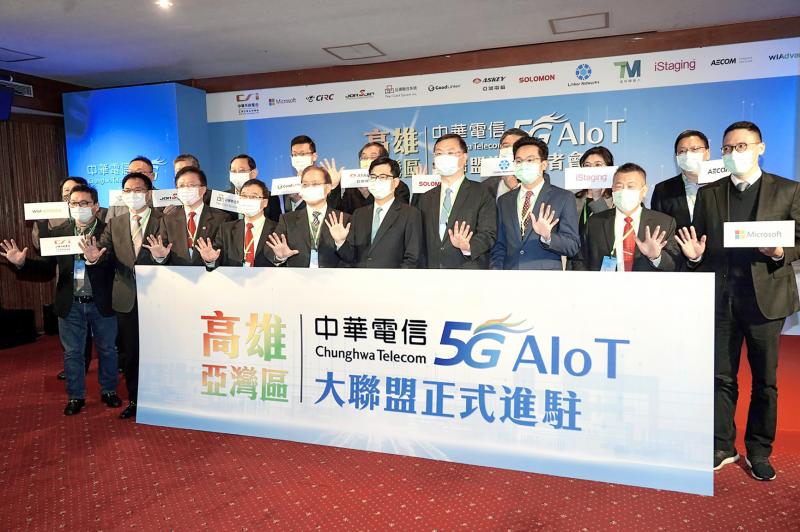Chunghwa Telecom Co (CHT, 中華電信) yesterday announced a NT$300 million (US$10.53 million) investment in Kaohsiung’s Asia New Bay Area (亞洲新灣區) along with 13 corporate partners to build information and communications technology (ICT), and 5G infrastructure in the area.
The investment is also aimed at developing new applications for 5G as part of the 5G AIoT (artificial intelligence of things) International Alliance, which the Kaohsiung City Government initiated on Nov. 30 last year, comprising the city government, some central government agencies, technology companies and telecoms.
Chunghwa Telecom was the first among the nation’s telecoms to obtain a 5G license from the government. It launched its 5G services on July 1 last year.

Photo: CNA
Chunghwa Telecom chairman Sheih Chi-mau (謝繼茂) told a news conference in Kaohsiung that its new investment would create more than 500 jobs over the next three years.
The project is a key part of Kaohsiung’s digital transition and would “let the world see Taiwan’s 5G capabilities,” Sheih said.
According to the company’s plan, Chunghwa Telecom would build a fiber-optic network in the Asia New Bay Area, construct cloud servers and create a 5G private network in the next three years.
The area would be a testing ground for new 5G applications, such as smart manufacturing, artificial reality/virtual reality, drone deliveries and other new applications, the company said.
Kaohsiung Mayor Chen Chi-mai (陳其邁) said that Chunghwa Telecom’s expertise with ICT would help Kaohsiung maximize its metropolitan capability.
“We hope Chunghwa Telecom will help push Kaohsiung’s digital transition and diversified industrial development forward, and accelerate the city’s development toward becoming a 5G smart port city,” Chen said.
Chunghwa Telecom’s 13 corporate partners include Microsoft Corp, Coretronic Corp (中光電), Jorjin Technologies Inc (佐臻), GoodLinker Co (谷林運算), Askey Computer Corp (亞旭電腦), Linker Networks Inc (寶蘊凌科), Techman Robot (達明機器人), iStaging Corp (愛實境) and WiAdvance Technology Co (緯謙科技).

CHIP RACE: Three years of overbroad export controls drove foreign competitors to pursue their own AI chips, and ‘cost US taxpayers billions of dollars,’ Nvidia said China has figured out the US strategy for allowing it to buy Nvidia Corp’s H200s and is rejecting the artificial intelligence (AI) chip in favor of domestically developed semiconductors, White House AI adviser David Sacks said, citing news reports. US President Donald Trump on Monday said that he would allow shipments of Nvidia’s H200 chips to China, part of an administration effort backed by Sacks to challenge Chinese tech champions such as Huawei Technologies Co (華為) by bringing US competition to their home market. On Friday, Sacks signaled that he was uncertain about whether that approach would work. “They’re rejecting our chips,” Sacks

NATIONAL SECURITY: Intel’s testing of ACM tools despite US government control ‘highlights egregious gaps in US technology protection policies,’ a former official said Chipmaker Intel Corp has tested chipmaking tools this year from a toolmaker with deep roots in China and two overseas units that were targeted by US sanctions, according to two sources with direct knowledge of the matter. Intel, which fended off calls for its CEO’s resignation from US President Donald Trump in August over his alleged ties to China, got the tools from ACM Research Inc, a Fremont, California-based producer of chipmaking equipment. Two of ACM’s units, based in Shanghai and South Korea, were among a number of firms barred last year from receiving US technology over claims they have

It is challenging to build infrastructure in much of Europe. Constrained budgets and polarized politics tend to undermine long-term projects, forcing officials to react to emergencies rather than plan for the future. Not in Austria. Today, the country is to officially open its Koralmbahn tunnel, the 5.9 billion euro (US$6.9 billion) centerpiece of a groundbreaking new railway that will eventually run from Poland’s Baltic coast to the Adriatic Sea, transforming travel within Austria and positioning the Alpine nation at the forefront of logistics in Europe. “It is Austria’s biggest socio-economic experiment in over a century,” said Eric Kirschner, an economist at Graz-based Joanneum

France is developing domestic production of electric vehicle (EV) batteries with an eye on industrial independence, but Asian experts are proving key in launching operations. In the Verkor factory outside the northern city of Dunkirk, which was inaugurated on Thursday, foreign specialists, notably from South Korea and Malaysia, are training the local staff. Verkor is the third battery gigafactory to open in northern France in a region that has become known as “Battery Valley.” At the Automotive Energy Supply Corp (AESC) factory near the city of Douai, where production has been under way for several months, Chinese engineers and technicians supervise French recruits. “They